Thanx Bratot.
Now even more, I would really like to see the original text.
Who are the Slavs? - Citations and Sources
Collapse
X
-
Originally posted by makedonin View PostI would like to see examples of this:
Or are this sciences exact as the quote above?
Gj. Puleski, do you have any copy of the original, or at least some Russian or other source to confirm this:
II Regno de gli Slavi , Mavro Orbini:
In one library in Tsarigrad(Constantinopel) , there is a charter about the privilegies that Alexander the Great gave to the Illyrians or " the nobel stock of Slavs" in his 12th years of rule. Its becoming quite understandable if we know that Macedonians of Alexander the Great were Slavs and they have spoken same language that todays inhabitants of macedonia speak. Alexander the Great is considered to be a Greek by many, but for no reason. The reason for that delusion lies in the fact that Greeks who fought people of east, were the most known people of the europe, the same way like nowdays Greeks and Turks belive that all european catholic people are French. Nevertheless, Moscow annals strictly confirm that Russians, or Moskovity spoke same language as Ancient Macedonians, that, beside other countires, ruled Egypt for 276 years.
Download the PDF File of the Book on Mavro Orbini
Leave a comment:
-
-
I would like to see examples of this:
Or are this sciences exact as the quote above?Во егзактната наука сите тие се дефинирани како СЛОВЕНИ.
Gj. Puleski, do you have any copy of the original, or at least some Russian or other source to confirm this:
Силна потврда на тој факт претставува наративниот споменик "Московски анали" од VIII век, кој денес се чува во централната библиотека во Москва.
Во него е напишано: "Ние, Русите – Московитите сме потомци на Античките Македонци.
Ние го зборуваме јазикот на Античките Македонци".Last edited by makedonin; 11-03-2009, 10:25 AM.
Leave a comment:
-
-
Originally posted by Gj. Puleski View PostI see that you are forgeting (or not knowing) the most important aspect about the Slavs issue: the aspect that they had existed on the Balkans in the times before Christ.
Here some statements from the author Petar Popovski:
-----------------------------------------------------------------------------------------------------------------------------------
Светската наука ги дефинира и ги третира Пелазгите како ПРОТО-СЛОВЕНИ, т.е. како предци на првите Словени. Тие први жители, во прво време, ги населувале приморските делови и островите на најјужниот дел од Балканот, просторите кои денес ги населуваат Грците, денешна Мореја, Атика, Пиреја, Пелопонез и Епир.
-----------------------------------------------------------------------------------------------------------------------------------
Според тоа, врз основа на постојниот доказен материјал, со кој располага македонската наука, присуството на Антите, Венетите и Феникијците т.е. на древните Македонци, кои меѓу третиот и првиот милениум пр.н.е. биле наречени Антички Македонци, на балканските простори датира меѓу 13 и 11 милениум пр.н.е. Што се однесува, пак, до Грците, на Балканот тие се јавуваат дури во периодот меѓу VIII и VI век пр.н.е., што значи десет до дванаесет милениуми подоцна од Античките Македонци.
И како тогаш е можно да постои некаква генетска врска меѓу тие два ентитета. Во никој случај. Подоцна, од Антите и Венетите се развиле уште десеттина други племенски гранки: Скити, Мизи, Бриги, Фриги, Миони, Пелагонци, Московити, Руси, Траки, Илири,
Дарданци и Трибали. Во егзактната наука сите тие се дефинирани како СЛОВЕНИ.
-------------------------------------------------------------------------------------------------------------------------------------
Кај нашиот народ постои уверување дека современите Македонци немаат никаква врска со античките и дека потекнуваат од зад Карпатите. Таквото сфаќање треба конечно и дефинитивно да се избрише од нашата меморија.
Таа теорија ја измислија и ја лансираа Англосаксонците, со цел да ја задушат македонската национална мисла, а да ја издигнат хеленската. За жал, тие тоа го прават и
денес. Нема автор од тој период, од крајот на VI и почетокот на VII век, кој во своето дело спомнува некакви Карпати.
Тоа е ноторна лага и измислица. Од најстари времиња Македонците биле и останале на своите древни македонски етнички простори. Македонија била и останала татковина на Македонците и прататковина на сите СЛОВЕНСКИ НАРОДИ. Сите тие народи потекнуваат од Балканот, од македонските простори.
Силна потврда на тој факт претставува наративниот споменик "Московски анали" од VIII век, кој денес се чува во централната библиотека во Москва.
Во него е напишано: "Ние, Русите – Московитите сме потомци на Античките Македонци.
Ние го зборуваме јазикот на Античките Македонци". Како што гледаме, сведоштво со кое се потврдува македонскиот карактер на сите СЛОВЕНСКИ НАРОДИ.
-------------------------------------------------------------------------------------------------------------------------------------
“Slavs” did not exist before Christ, because no one identified themselves as “Slav” nor were there others that identified such particular people before Christ’s time.
However, there are the descendants of what would become “slavs” or slav speakers to todays time, they be a combination of all ancient people whether they be Illyrians, thracians, dacians, macedonians, greeks, romans, germanic tribes etc etc. Obviously some more predominant than others.
“Slavs” as identified of course evolved from various ancient people (as mentioned above), but those ancients had specific identities or tribal names, whilst “Slav” is a term coined much later, predominantly utilised by the Byzantines for those initially in contact with the Byzantine frontier.
As such it’s incorrect to say that “Slavs” had existed before such time (that is before Christ)and likewise loosely apply it to ancient people because the circumstances weren’t yet created for them to be identified as such (Slav), whether that be by others or themselves.
Leave a comment:
-
-
You are very right on what I made bold in your comment. Here's something from 1918 about Macedonia. This is where historians and observers confuse things.Originally posted by I of Macedon View PostI think westerners (probably also many slavists) believe that if people don’t call themselves today let say Thracian or Dacian; therefore it must mean that the Thracian or Dacian people must be extinct. Yet they don’t know how, when, or can’t provide proof of such a vast extinction of people and at the same time strangely believe in the theory of an unprecedented demographic explosion (bound to the realms of impossibility) of the “Slavs” encompassing half of Europe and in such a short time history. Thus “Slav” people today are just “Slavs” and nothing else, no history and some how the only people in the world with no ancient descendents before the sixth century, As laughable as that is, that how many like to think of all the Slavonic speakers today.
Yet what of the ancient sources (this for just one example) that tell us of the Thracians that take many names depending on where they reside and so on. I guess the dots can’t be connected here, perhaps because it would be too inconsistent with the Slavic migration theory. Obviously people do move, migrate etc, but some theories like to stretch the imagination just a bit too much.
Therefore what is more logical the mass extinction of half of Europe (with no evidence of such only theories and assumptions) and likewise the impossible theory of the demographic explosion that followed, or that people, tribes etc had taken on new names depending on their surroundings, politics, change of empires, religion etc.
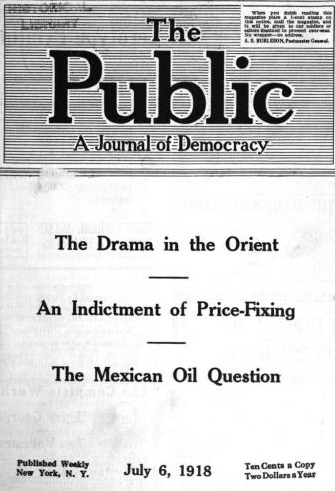
page 1076

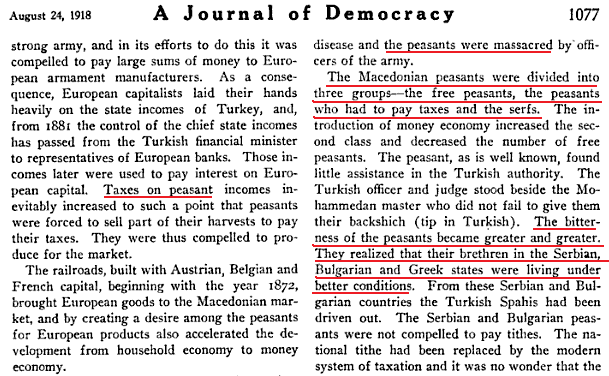
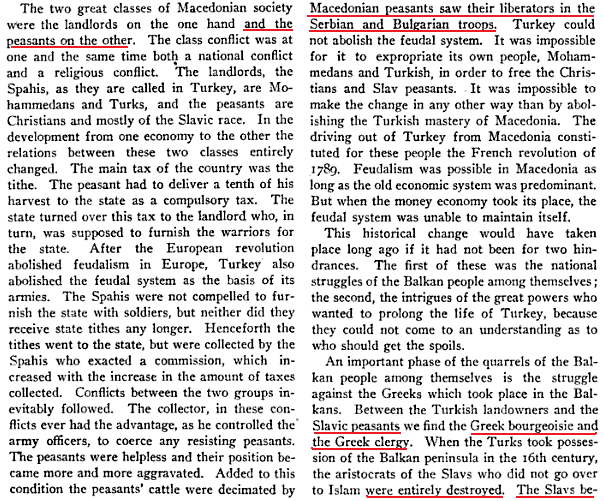
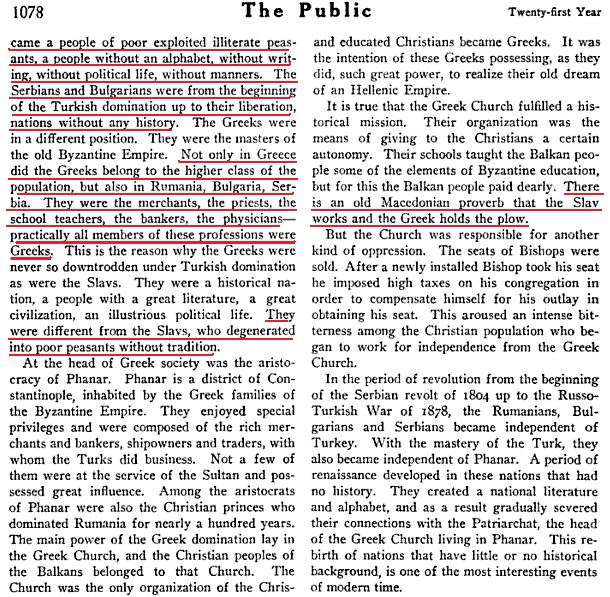
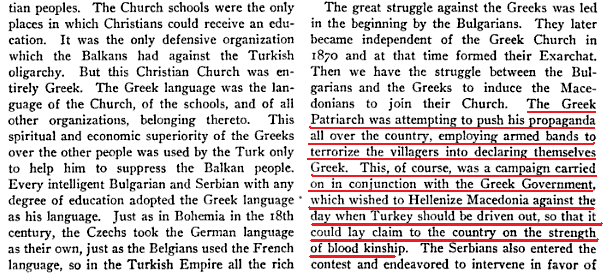
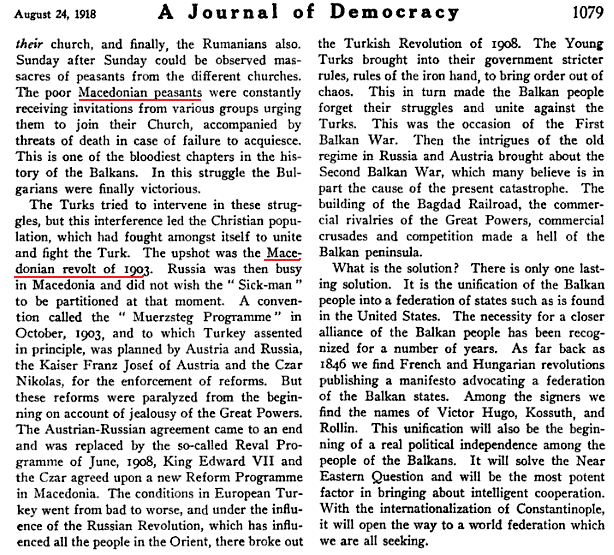
Now this is what Victor Roudometof said about this whole situation about "Serbs-Bulgars-Slavs-Peasants-No History" and "Greeks-Merchants-Bourgeosie-Upper Class"
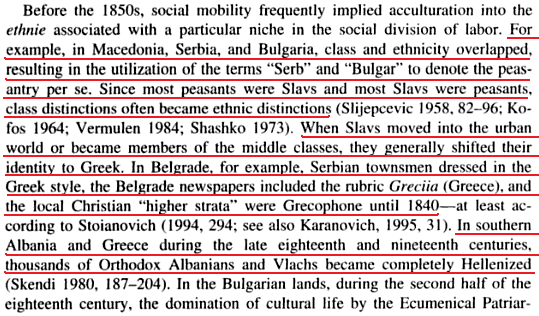
Leave a comment:
-
-
I see that you are forgeting (or not knowing) the most important aspect about the Slavs issue: the aspect that they had existed on the Balkans in the times before Christ.
Here some statements from the author Petar Popovski:
-----------------------------------------------------------------------------------------------------------------------------------
Светската наука ги дефинира и ги третира Пелазгите како ПРОТО-СЛОВЕНИ, т.е. како предци на првите Словени. Тие први жители, во прво време, ги населувале приморските делови и островите на најјужниот дел од Балканот, просторите кои денес ги населуваат Грците, денешна Мореја, Атика, Пиреја, Пелопонез и Епир.
-----------------------------------------------------------------------------------------------------------------------------------
Според тоа, врз основа на постојниот доказен материјал, со кој располага македонската наука, присуството на Антите, Венетите и Феникијците т.е. на древните Македонци, кои меѓу третиот и првиот милениум пр.н.е. биле наречени Антички Македонци, на балканските простори датира меѓу 13 и 11 милениум пр.н.е. Што се однесува, пак, до Грците, на Балканот тие се јавуваат дури во периодот меѓу VIII и VI век пр.н.е., што значи десет до дванаесет милениуми подоцна од Античките Македонци.
И како тогаш е можно да постои некаква генетска врска меѓу тие два ентитета. Во никој случај. Подоцна, од Антите и Венетите се развиле уште десеттина други племенски гранки: Скити, Мизи, Бриги, Фриги, Миони, Пелагонци, Московити, Руси, Траки, Илири,
Дарданци и Трибали. Во егзактната наука сите тие се дефинирани како СЛОВЕНИ.
-------------------------------------------------------------------------------------------------------------------------------------
Кај нашиот народ постои уверување дека современите Македонци немаат никаква врска со античките и дека потекнуваат од зад Карпатите. Таквото сфаќање треба конечно и дефинитивно да се избрише од нашата меморија.
Таа теорија ја измислија и ја лансираа Англосаксонците, со цел да ја задушат македонската национална мисла, а да ја издигнат хеленската. За жал, тие тоа го прават и
денес. Нема автор од тој период, од крајот на VI и почетокот на VII век, кој во своето дело спомнува некакви Карпати.
Тоа е ноторна лага и измислица. Од најстари времиња Македонците биле и останале на своите древни македонски етнички простори. Македонија била и останала татковина на Македонците и прататковина на сите СЛОВЕНСКИ НАРОДИ. Сите тие народи потекнуваат од Балканот, од македонските простори.
Силна потврда на тој факт претставува наративниот споменик "Московски анали" од VIII век, кој денес се чува во централната библиотека во Москва.
Во него е напишано: "Ние, Русите – Московитите сме потомци на Античките Македонци.
Ние го зборуваме јазикот на Античките Македонци". Како што гледаме, сведоштво со кое се потврдува македонскиот карактер на сите СЛОВЕНСКИ НАРОДИ.
-------------------------------------------------------------------------------------------------------------------------------------Last edited by Gj. Puleski; 11-01-2009, 05:21 PM.
Leave a comment:
-
-
I think westerners (probably also many slavists) believe that if people don’t call themselves today let say Thracian or Dacian; therefore it must mean that the Thracian or Dacian people must be extinct. Yet they don’t know how, when, or can’t provide proof of such a vast extinction of people and at the same time strangely believe in the theory of an unprecedented demographic explosion (bound to the realms of impossibility) of the “Slavs” encompassing half of Europe and in such a short time history. Thus “Slav” people today are just “Slavs” and nothing else, no history and some how the only people in the world with no ancient descendents before the sixth century, As laughable as that is, that how many like to think of all the Slavonic speakers today.
Yet what of the ancient sources (this for just one example) that tell us of the Thracians that take many names depending on where they reside and so on. I guess the dots can’t be connected here, perhaps because it would be too inconsistent with the Slavic migration theory. Obviously people do move, migrate etc, but some theories like to stretch the imagination just a bit too much.
Therefore what is more logical the mass extinction of half of Europe (with no evidence of such only theories and assumptions) and likewise the impossible theory of the demographic explosion that followed, or that people, tribes etc had taken on new names depending on their surroundings, politics, change of empires, religion etc.
Leave a comment:
-
-
Guys the word slav became more prominent when Macedonia joined with yugoslavia.All it's neighbours were peddling their little propaganda trying to teach the macedonian nation to be proud of its slavic roots & not to take pride in the ancient macedonian roots.Both serbia & greece used it extensively to coverup the fact that the macedonian people had links to their ancient heritage.The slavs had the same impact on the other countries such as greece,turkey,bulgaria,& Albania.Do they identify as SLAVIC NO!!
To label macedonia as slavic is utterly false as the slavs adopted the macedonian language because they were illiterate.
THey the SLAVS became macedonised and anyone saying they didn;t is wrong.THe macedonians have always been macedonian it's only through heavy duty propaganda that during the 20th century such as the greeks & serbs have been trying to brainwash the macedonian population into believing that they are just slavs which is not true.WE are MACEDONIANS if you think you are SLAVS then go back & call yourself YUGOSLAV
Leave a comment:
-
-
I hate this title.
There are a couple of ways of approaching this problem of "Slavs". One is to accept the term as valid currency, but find out who is behind it. The other is to reject the term, on the basis of academic dishonesty and deliberate distortion. The fact is that there never were any "Slavs" ! This is the first point. The fact that the term is widely used, does not mean it is honest, or accurate. Two, the various invading tribes were not called "Slavs" by their contemporaries !! I can't stress that enough. A closer reading of the terminology, in Greek and in Latin, shows a completely different word to the one used in this title, or thrown around by various Western writers and academics. Three, if we jump foward by 1,500 years the term "Slav" still has no meaning, except as a political tool. It is not a nation, it is not an ethnic group. It is a linguistic group - and the linguistic group is not called "Slav" rather "Slavic". Four there is no connection between the "Slavic speakers" of today and 6th century invaders, because contemporaries told us nothing about the 6th century invaders - i.e., what language they used ...etc. We assume that these 6th century invaders use the same langauge we do today, and we assume that the natives of the region did not. We assume that natives we wiped out, even though we barely have any evidence of that native languages of the balkans, and NO evidence of the language spoken by 6th century invaders.
What I would find interesting is how the term "Sklavenoi" morphed in the old literature (if it in fact did at all).
Leave a comment:
-
-
I found something that prooves as far back as middle of the first century macedonians existed in the Agean Macedonia.
Don't know if anyone is aware of St Irene who was born in solun macedonia. There are some contentious issues though.
A) serbs claim she is a serb (but born in macedonia go figure)
B) A document from the russian orthadox church say she was born mid 1st century but some articals quote she was around middle of the 3rd century. Ither way lond time ago.
C) again, writers say she was a slav, what the heck is a slav? But thats modern writers for yah.
But thats modern writers for yah.
Here is the page from the russian orthadox church. use google translate to understand it. Be aware this church make it sound a bit of a fairytale. lol But
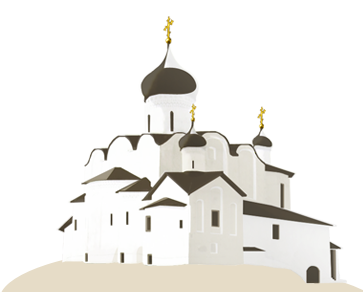 Великомученица Ирина Македонская
Великомученица Ирина Македонская
Here is a english version from a russian orth church in the usa
Leave a comment:
-
-
Source: Byzantion by Société belge d'Études byzantines, Centre national de recherches byzantines, Byzantine Institute of America (1948).Basilitzes whom at one time the emperor Alexander had thought of raising to the throne was doubtless a highly hellenized Slav.
I don't agree with "hellenized" part but I would agree that this Basilitzes was Chritianized and Romanized.
Leave a comment:
-
-
Here's more from Theophanes;
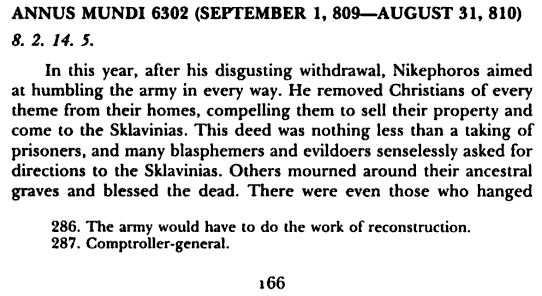
It seems that Nikephoros had a problem with keeping Roman citizens in the 'Sklavinias' and in turn tried to make them all move their.
Leave a comment:
-
-
Good stuff TM! I will add some of them on the first post.Originally posted by TrueMacedonian View Post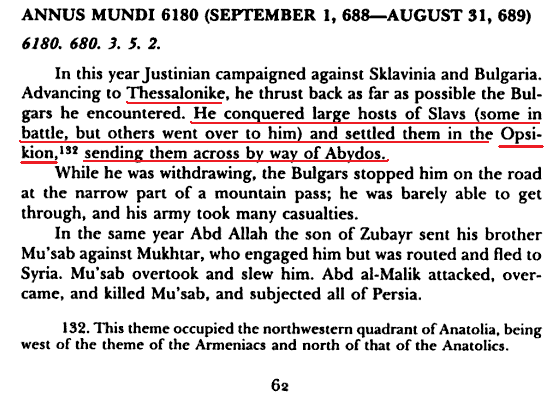
page 64

page 65


These pages are taken from The Chronicles of Theophanes.
Leave a comment:
-


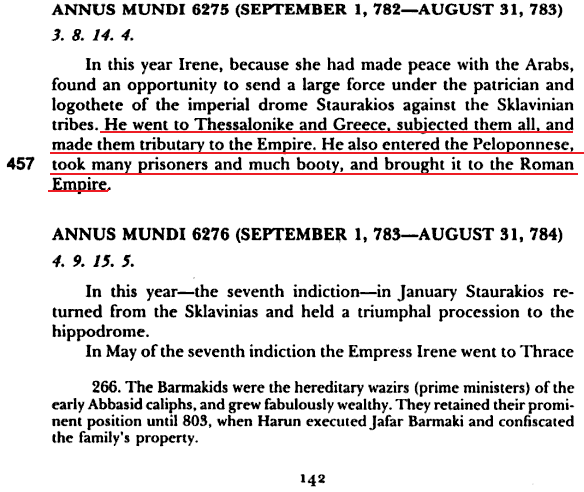
Leave a comment: